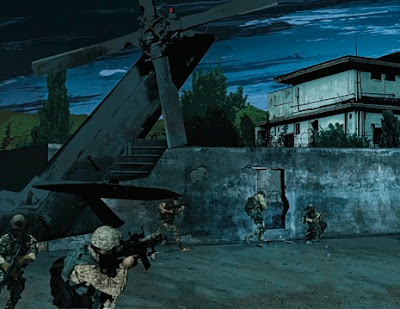 |
| ...he steered the cart around all the bumps in the road. |
The next morning, as they loaded their cart with their few possessions, the largest of which were the two scroll boxes, they were happy to see Fred ambling up the road, carrying a heavy bag. “Tha were serious last night, weren’t tha? Me ma said tha were just bein’ kind, and that I were a fool to believe tha.”
Gwilym clapped the man on his shoulder and told him to pack his goods in the wagon. “We’ll all be comfortable in the cart together.”
The three of them picked up the pallet, together with the sleeping babies inside and stowed it safely in the space left between the boxes. With a last look on the quiet village, they headed off on the eastern track to meet the Roman road.
The cart was not heavily laden so they made steady progress but the bumping threatened to wake the babies. Fred was getting more anxious and finally burst out, “Tha knows I’m t’better driver. Give me t’reins.” Taking these from Gwilym, he steered the cart around all the bumps in the road. They traveled away from the coast and through a country unspoiled by Saxon raids. While Bleddyn stared silently at all the new sights around him, Gwilym and Bleddyn discussed the new project.
“I’ll know more when I get on the site, but Sir Kay has given me a new charter that explains a lot. He likes these charters and gives them out to all the new builders.” Gwilym smiled at Fred who touched his nose significantly.
“That were a great idea of tha, gettin’ it all written down so none could argue. So what do this one say?”
“Well, it’s curious. They want a watch-tower; I suppose it is one of a series of watchtowers leading from the north coast inland to warn of marauding Norsemen. But if it is just for passing on signals, why is it built to hold a garrison of men and to be defensible? There is a ferry there across the Ouse, so perhaps it's needed to defend the ford? We’ll have to see when we arrive.”
“And how will we be makin’ this tower better than t’last one?”
Gwilym thought long and hard. “There were a lot of problems last time and they seem to all stem from not knowing exactly what everyone wanted. The charter showed what the king wanted, and I did well following that exactly, but I think instead we need more of an overall understanding from the king, and allow the people who will be using the tower and the people who have to build it to have some say in what the real requirements are. And from there we can figure out exactly what we are doing and how to get it done.”
Fred was humming softly to himself and thinking hard about something. “What were you just doing?” asked Gwilym when Fred seemed to be finished.
Fred blushed deeply and mumbled, “Oh, just trying to remember what tha told me.”
“Please explain.”
“Well, tha knows I cannae write. I’m too stupid for that. Even your son can write and here I am, a grown man but too stupid. So I remember things by songs. I know, it be stupid but it’s me only way.”
“Fred. You’re not a stupid man. I’ve seen you grasp the concepts of building faster than any other man I’ve worked with. Ignorance of the skill of writing is not stupidity. Men were remembering things by song long before someone thought to write them down. These scrolls I carry are just the written words of long-ago songs. But sing me your song about tower building. I’d be privileged to be your audience.”
Fred alternated blushing and smiling and stammered out that it wasn’t a song about building towers. “I figure that t’song would work for any kind of buildin’, any kind of project for that matter. It be a song about gettin’ a group together and doin’ sommat…when they be not thy men…when tha not be in charge of them tha see?”
Gwilym smiled in genuine respect and asked the man, “Sing me your song. I think I could learn a lot from it.”
“Tha be the one teachin’ me. I’m just rememberin’ it. T’song’s not ready yet but I can give tha a taste for it.”
“Please do.”
Fred cleared his throat, then sang out in a clear tenor:
If tha want thy project to be no harder
Go to the king to sign thy charter
Make sure it says how small or large
And says quite clearly that tha’re in charge
It should show how it meets the kingdom’s need
And keeps all the others from their greed
It went on like this for a while, describing the charter, the list of stakeholders and some awkward verses about scope and requirements. Fred stopped then and said he had to work out those last verses better when he knew more about them and had seen how they work.
“Fred! You’ve done a great thing here. Please keep building on your song. When it’s done you’ll have the guide for Project Management. I can write it down for you in a scroll and you’ll be famous as a teacher of future Project Managers.”
“Ach! Tha’s just havin’ fun wi’ me now. Leave off.”
“No Fred. I’m quite serious. You’ve created something important. Please do keep it going.”To read the entire first draft in one shot, click here:






